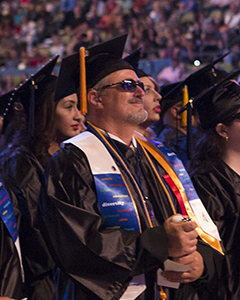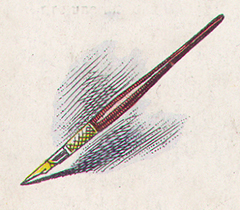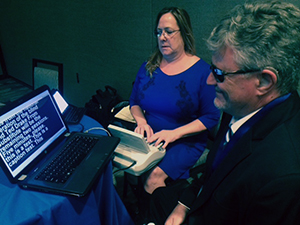
Here is an in-depth interview with VisionAware peer advisor, Steven J. Wilson, who shares his life in how he went from having a successful career working on yachts to accepting his dual sensory disability as a deaf/blind person. He has recently completed a Liberal Arts degree program of studies while also raising his daughter as a single dad. His secret? It’s all about changing attitudes and addressing others with a smile!
Being Deaf-Blind
Q: Steven, can you briefly describe your deaf-blindness condition?
A: Absolutely, Maribel, but first, let me start out by thanking you for allowing me the opportunity to help spread awareness about the deaf/blind people and communities. I’ve had a genetic disorder all my life called Usher Syndrome. However, my hearing loss wasn’t discovered until I attended kindergarten. After further tests, my hearing loss was labeled as ‘severe’. I repeated kindergarten the following year with hearing aids in the hope that I would ‘catch up’ to my young peers.
During my early teenage years, I only realize now in reflection that my vision was being affected too. Back then, when I first noticed spots in my vision and had difficulty seeing in the dark, I sought out a local eye doctor. He dismissed my concerns stating that I’d be just fine. From then on, I accepted my life as a constant struggle and that my lack of seeing clearly was a unique vision problem that I had to deal with.
I certainly struggled during that time and before a proper diagnosis of my dual sensory disability, I avoided driving at night. Reading books became more difficult which was detrimental since I so relied on this medium because I couldn’t hear very well and most all other activities at night. Believe it or not, it wasn’t until 8 years ago, age 41, that I was officially diagnosed with Retinitis Pigmentosa.
The situation today is that my eyesight has degenerated more quickly than my hearing and is classified as severe because I have no peripheral vision, my central vision appears as ‘spotty,’ I’m losing the ability to correctly identify colors, and my depth perception is almost entirely gone now. My hearing has been ‘upgraded’ from ‘severe’ to ‘profound’.
Growing Up
Q: What was it like growing up as a deaf-blind child in your community?
A: Interestingly, about 10 years ago I visited an old friend with whom I had grown up with and raised a similar question. He stated it best by saying, "it was a NON-issue!"
I had the most wonderful friends to grow up with and for the most part, my hearing and sight loss really weren’t an issue. As curious as kids can be, it was natural for the children around me to learn by asking questions and resolving problems as they arose.
Sure, there was the usual bullying by other kids, but mostly, I had a wonderful childhood filled with playing ball, riding bikes and interacting with other children. When I’ve inquired with my mother as to why she did not send me to a special school to learn ASL and instead preferred to enroll me in a ‘regular’ school or rather, ‘mainstream’, she stated she wanted me to go to school and live life "…just as any other boy would."
Through the years, my mother has been a pillar of love and support, encouraging me to be more positive whenever I began to succumb to self-pity or negative feelings.
Helping Others
Q: What is one thing you strive to achieve in life that your childhood taught you?
A: My basic philosophy in life is simply: Never give up. And also: Never back down.
Over the years, this has caused me trouble yet, it’s what has kept me going. The single most important driving force that urges me forward is to help others; whether it be through sharing a kind word, providing advice based on my life’s challenge with a dual disability, or offering people a possible direction to useful resources —anything I can do in order to help another person face their sensory difficulties and boost their ability to become successful individuals brings me a sense of purpose and fulfillment.

Continuing Education with a Dual Disability
Q: I understand you are completing an Arts degree and can you share some of the challenges you face in this community as a deaf-blind undergraduate?
A: I have recently graduated from Pima Community College and earned an AGEC-A certificate (Arizona), as well as earning my Associate of Arts Liberal Arts degree.
The two major challenges I faced by taking on this college adventure were hearing the instructors and students in traditional classroom settings AND trying to read printed textbooks as well as screen coursework for the online classes.
I didn’t have any idea of the assistance that is available to people in the deaf community and the blind or visually impaired, and so I was greatly relieved once I learned of the assistive technology available for me to capitalize on, which served as a great motivational tool in staying on top of my subjects.
For example, deaf students are entitled to have interpreters who use American Sign Language (ASL). However, for some of us who never had the opportunity to learn this form of communication, there are CART services available (Communication Access Real-time Translation). This is like Closed Captioning in real time and was a huge life-saver in enabling me to follow the entire lecture instead of merely guessing at people’s conversations
Assistive Technology
Q: Do you use assistive technology and if so, what are your preferred ‘tools’?
A: Have I mentioned CART? This has been a huge help during classroom learning, and my CART transcribers were quick to collaborate with me and my needs and obliged willingly. It is with this superb technology, should the worst ever occur and I go completely blind, that I will still be able to utilize CART but, instead of viewing a computer screen, I will be using a refreshable Braille display along with JAWS or Voiceover since those are driver’s that makes Braille displays possible.

Other assistive technology for the blind and visually impaired like Zoom Text and Windows Magnifier are my most often ‘go-to’ computer programs that enhance my ability to study because I use color inversion – which means changing a white background to black and black text to white font that is easier for me to see.I also use an iPhone and iPad, preferring to utilize the software already installed on these devices like Voice-Over and Invert Color as their accessibility features. I enjoy trying out different software and accessible apps – with two new discoveries
‘Aipoly’ is basically a program that utilizes the camera on an iPhone or iPad and helps with object and color recognition. But the best program I can recommend for those with low vision who may never have seen, or wish to reconnect with the night sky is one called ‘SkyView’. Oh, my goodness! The joy in seeing the stars, constellations, and planets on their travel paths – as I haven’t been able to see anything but darkness in the night sky for 30 years until quite recently.
Being a Father
Q: You are also a father. Can you share any parenting strategies from a deaf-blind perspective?
A: Being a dad is one of the most rewarding aspects of living this wonderful life. While I’ve never really given much thought to parenting strategies, I suspect some of my working tactics as a person who is both deaf and blind include holding my daughter’s hand as we walk to and from school every day. Staying in touch in this way gives my daughter the opportunity to grab my attention by shaking my hand vigorously when she has something to say. I am alerted to her needs and, as I can still lip read, this form of communication enables us to talk above the noise from passing traffic.
Even though her tactic to shake my hand vigorously is her way of garnering my attention, she also knows she has to speak clearly, loudly, and by now, is used to having to repeat herself more than once without it being a problem. Personally, I think it important for people in general to improve their ability to have patience with one another. My daughter and I are tested regularly for patience due to my sensory disability. But what really matters most in our lives is happiness.
Words of Wisdom
Q: For those who may be new to living with a dual disability, such as being deaf and blind, what words of wisdom can you share from your personal experience?
A: Keep your smile on. I’ve witnessed complete attitudes change simply by addressing others with a smile and that smile is oftentimes very contagious. Also, I have learned how important it is to be willing to accept change. When we can be open and flexible in the face of a life-challenge, we can adapt in other ways we may not have had to consider before. By doing so, we can still marvel and appreciate life in all its splendor — as a life that has meaning and many things still to offer us.
The key is knowing that we can all do anything we strive to do and, should we blunder at our first few attempts, we should never fail to try again. Just find a way that suits you and you can achieve your dreams no matter what. You will be amazed that when you try, you soon find yourself surrounded by generous, loving people who gladly want to help. Over time, you will discover your life encompassed by more generosity than you ever thought possible.
More About Steven
Steven J. Wilson grew up in the high deserts of northern Arizona and now lives in the southern desert of Arizona. He has worked on yachts, houseboats, speedboats and personal water craft in Arizona, Utah, northern California, Wisconsin, and Mississippi. As a deaf-blind person, Steven has raised 2 boys and is currently raising a daughter as a single parent while completing his studies at the University of Arizona with the end goal of obtaining a Master’s degree in Rehabilitation Counseling.